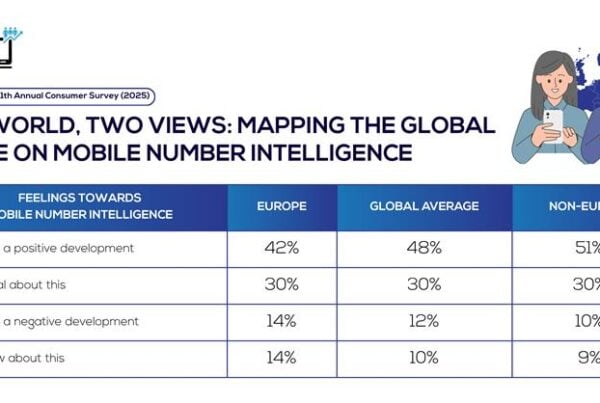MEF’s Riccardo Amati explores Link Mobility’s Q2 results highlight both the risks and rewards of transition. While organic revenues fell, acquisitions and growth in higher-margin conversational channels helped expand profitability. With investors cautious on short-term sales declines, the company’s pivot away from low-margin traffic underscores a broader industry shift: margins now matter more than message volumes in enterprise communications.
Acquisition-led expansion and conversational messaging growth offset falling organic sales. As the company pivots away from low margin volume, investors take profits on the stock.

The shares of Link Mobility Group fell more than five percent following its second-quarter earnings release, as investors reacted to a larger-than-expected decline in organic revenue. Despite stronger-than-anticipated profitability growth, concerns over shrinking top-line figures weighed on sentiment, highlighting that the company’s pivot away from low-margin traffic may come at a near-term cost. This tempered enthusiasm around margin improvements and Link’s first major expansion outside Europe. Still, the stock remains up 57% from a year ago.
Link’s headline numbers painted a paradox. Sales fell by about three percent year-on-year, while organic revenue dropped by eleven percent. Link’s focus beyond basic SMS messaging toward higher-value services is not yet replacing the volume being lost. In other words, the strategy is working in terms of margins—gross profit was up by more than 10%, while adjusted EBITDA rose by 18%, both supported by a richer product mix and the contribution from the South African subsidiary SMSPortal—but the shrinking revenue base suggests a period of adjustment that investors are not willing to wait out without some skepticism.
The transition from A2P to CPaaS is accelerating, raising both opportunities and risks for incumbents: cannibalization of legacy revenues on the one hand, but richer, more defensible margins on the other.“
Management pointed to the ongoing transition toward Rich Communication Services (RCS) and conversational APIs as key to its future, signaling that value creation would increasingly be driven by deeper engagement rather than bulk traffic. For the mobile ecosystem, the lesson is clear: margins now matter more than message volumes.
Margin over Volume
“We are proud of the substantial progress Link achieved in the second quarter, combining solid growth with a landmark transaction,” said CEO Thomas Berge on the earnings call. “The acquisition of SMSPortal marks a level-up milestone, transforming Link into a 1.1 billion adjusted EBITDA company. The trend of accelerated growth for higher-margin advanced conversational solutions on RCS and WhatsApp is continuing both in the Profit and Loss statement (P&L) as well as in all-time high new contracts for Communications Platform as a Service (CPaaS) products.”
The figures bore out his point. Revenue slipped to the equivalent of $165 million from $170 million a year ago, with organic revenue falling to about $193.2 million. Yet gross profit climbed to roughly $42 million from $37.8 million while adjusted EBITDA jumped to about $21 million. Profit margins expanded by more than two percentage points.
On a pro forma basis including SMSPortal, gross profit exceeded $46 million, up seven percent, while adjusted EBITDA approached $27 million, a twelve percent increase. These gains were driven by SMSPortal’s contribution, as well as stronger-than-expected demand for CPaaS contracts and richer messaging channels.
Looking ahead, management guided for high single-digit gross profit growth, with EBITDA expected to grow faster than gross profit. The company reaffirmed its disciplined M&A strategy, signaling that accretive acquisitions will remain its top capital allocation priority, backed by a leverage policy capped at 2.5 times EBITDA.
The Messaging Awakens
While acquisitions bolstered the quarter, the company’s bet on conversational messaging is becoming more central to its narrative. RCS, long considered the heir apparent to SMS, gained traction in Northern Europe with early campaigns delivering engagement rates above 45% and open rates above 90%.
RCS and conversational APIs accounted for more than half of new contract wins in the quarter—surpassing traditional Application to person (A2P) SMS for the first time. The company noted that RCS contracts quadrupled year-on-year, now making up nearly a quarter of total deals signed.
Berge stressed the shift: “Growth momentum is supported by increased adoption of digital messaging and traction on higher-margin CPaaS software solutions and OTT channels. CPaaS contract wins exceeded A2P for the first time, while RCS contracts grew fourfold.”
Such adoption underscores a broader trend in enterprise communications: the move from one-way notifications to interactive, customer-centric dialogues. Link’s channel-agnostic strategy positions it to capture these flows, particularly as Apple prepares to roll out RCS support in the Nordics in early 2026.
Lessons for The Mobile Ecosystem
The broader implications for the mobile ecosystem are significant. First, the quarter showed that scale alone is no longer enough—operators and aggregators must migrate to higher-value conversational models or risk margin compression. Second, the role of acquisitions is expanding as geographic diversification becomes vital in a fragmented industry. Finally, the transition from A2P to CPaaS is accelerating, raising both opportunities and risks for incumbents: cannibalization of legacy revenues on the one hand, but richer, more defensible margins on the other.
In short, Link’s Q2 results illustrate the crossroads at which enterprise messaging now stands. Investors may have sold the stock on short-term revenue declines, but the underlying story is one of structural transformation—one that the entire industry will have to navigate.
Link Mobility Group is a Member of the Mobile Ecosystem Forum (MEF).





